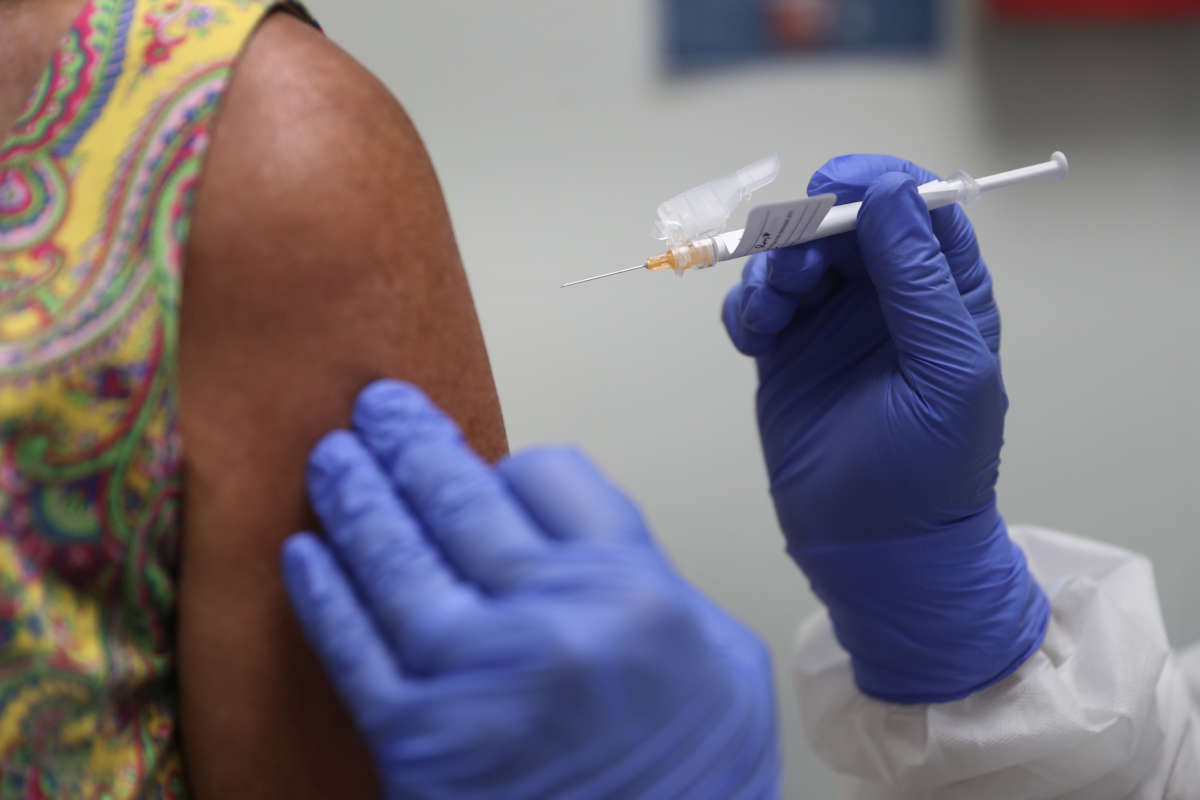April 16 was a big day for Moderna, a Massachusetts biotech company on the verge of becoming a front-runner in the U.S. government’s race for a coronavirus vaccine. It had received roughly half a billion dollars in federal funding to develop a COVID shot that might be used on millions of Americans.
Thirteen days after the massive infusion of federal cash — which triggered a jump in the company’s stock price — Moncef Slaoui, a Moderna board member and longtime drug industry executive, was awarded options to buy 18,270 shares in the company, according to Securities and Exchange Commission filings. The award added to 137,168 options he’d accumulated since 2018, the filings show.
It wouldn’t be long before President Donald Trump announced Slaoui as the top scientific adviser for the government’s $12 billion Operation Warp Speed program to rush COVID vaccines to market. In his Rose Garden speech on May 15, Trump lauded Slaoui as “one of the most respected men in the world” on vaccines.
The Trump administration relied on an unusual maneuver that allowed executives to keep investments in drug companies that would benefit from the government’s pandemic efforts: They were brought on as contractors, doing an end run around federal conflict-of-interest regulations in place for employees. That has led to huge potential payouts — some already realized, according to a KHN analysis of SEC filings and other government documents.
- Slaoui owned 137,168 Moderna stock options worth roughly $7 million on May 14, one day before Trump announced his senior role to help shepherd COVID vaccines. The day of his appointment, May 15, he resigned from Moderna’s board. Three days later, on May 18, following the company’s announcement of positive results from early-stage clinical trials, the options’ value shot up to $9.1 million, the analysis found. The Department of Health and Human Services said Slaoui sold his holdings May 20, when they would have been worth about $8 million, and will donate certain profits to cancer research. Separately, Slaoui held nearly 500,000 shares in GlaxoSmithKline, where he worked for three decades, upon retiring in 2017, according to corporate filings.
- Carlo de Notaristefani, an Operation Warp Speed adviser and former senior executive at Teva Pharmaceuticals, owned 665,799 shares of the drug company’s stock as of March 10. While Teva is not a recipient of Warp Speed funding, Trump promoted its antimalarial drug hydroxychloroquine as a COVID treatment, even with scant evidence that it worked. The company donated millions of tablets to U.S. hospitals and the drug received emergency use authorization from the Food and Drug Administration in March. In the following weeks, its share price nearly doubled.
- Two other Operation Warp Speed advisers working on therapeutics, Drs. William Erhardt and Rachel Harrigan, own financial stakes of unknown value in Pfizer, which in July announced a $1.95 billion contract with HHS for 100 million doses of its vaccine. Erhardt and Harrigan were previously Pfizer employees.
“With those kinds of conflicts of interest, we don’t know if these vaccines are being developed based on merit,” said Craig Holman, a lobbyist for Public Citizen, a liberal consumer advocacy group.
An HHS spokesperson said the advisers are in compliance with the relevant federal ethical standards for contractors.
These investments in the pharmaceutical industry are emblematic of a broader trend in which a small group with the specialized expertise needed to inform an effective government response to the pandemic have financial stakes in companies that stand to benefit from the government response.
Slaoui maintained he was not in discussions with the federal government about a role when his latest batch of Moderna stock options was awarded, telling KHN he met with HHS Secretary Alex Azar and was offered the position for the first time May 6. The stock options awarded in late April were canceled as a result of his departure from the Moderna board in May, he said. According to the KHN analysis of his holdings, the options would have been worth more than $330,000 on May 14.
HHS declined to confirm that timeline.
Join us in defending the truth before it’s too late
The future of independent journalism is uncertain, and the consequences of losing it are too grave to ignore. To ensure Truthout remains safe, strong, and free, we need to raise $43,000 in the next 6 days. Every dollar raised goes directly toward the costs of producing news you can trust.
Please give what you can — because by supporting us with a tax-deductible donation, you’re not just preserving a source of news, you’re helping to safeguard what’s left of our democracy.
